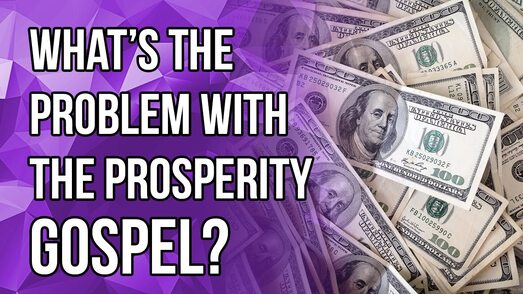In the prosperity gospel,” the believer is told to use God. The truth of biblical Christianity is just the opposite—God uses the believer. Prosperity theology sees the Holy Spirit as a power to be put to use for whatever the believer wills. The Bible teaches that the Holy Spirit is a Person who enables the believer to do God's will.
A favorite term of prosperity gospel teachers is “positive confession.” This refers to the teaching that words themselves have creative power. What you say, prosperity teachers claim, determines everything that happens to you. Your confessions, especially the favors you demand of God, must all be stated positively and without wavering. Then God is required to answer (as though man could require anything of God!). Thus, God's ability to bless us supposedly hangs on our faith.
Matthew 21:21 (NLT2)21 Then Jesus told them, “I tell you the truth, if you have faith and don’t doubt, you can do things like this and much more. You can even say to this mountain, ‘May you be lifted up and thrown into the sea,’ and it will happen.
Matthew 18:19 (NLT2)19 “I also tell you this: If two of you agree here on earth concerning anything you ask, my Father in heaven will do it for you.
Mark 11:24 (NLT2)24 I tell you, you can pray for anything, and if you believe that you’ve received it, it will be yours.
John 14:14 (NLT2)14 Yes, ask me for anything in my name, and I will do it!
John 15:7 (NLT2)7 But if you remain in me and my words remain in you, you may ask for anything you want, and it will be granted!
1 John 5:14-15 (NLT2)14 And we are confident that he hears us whenever we ask for anything that pleases him.15 And since we know he hears us when we make our requests, we also know that he will give us what we ask for.
These represent just a sampling of the New Testament’s sweeping claims made in plain language. If these things are true and absolute absolute how do we account for unanswered prayer. Some are relatively trivial unanswered prayers: for example, a baby that refuses to sleep and cries louder every time the harried mother prays for relief, or prayer for a parking space near the door and the closet one is at the end of the parking lot.. Others are unanswered prayers with more serious consequences. Scars from abuse not by bullies but by family members. A child with cystic fibrosis. A mother with severe Alzheimer’s who has suddenly turned violent. Breast cancer, a brain tumor, pancreatic cancer.
Some blame themselves, for the prayers going unanswered, believing the Christian brothers and sisters who tell them that if they just had enough faith they would get the answer they want.proper. Some, looking for bright spots, point out that prayer does not work according to a fixed formula you have to get your life in order, you have to say say the right words, and the desired result will come. If that were true, Job would have avoided much suffering, Paul would have shed his thorn in the flesh, and Jesus would never have gone to Golgotha.
One possible explanation centers in the specific group of people who Jesus was addressing: He was addressing the disciples. Could it be that Jesus gave the Twelve men, who He handpicked to carry on the work after his death, certain rights and privileges in prayer that would not be the norm for every follower? The Gospel writers do not explicitly say “These commands apply to the disciples only,” but they do specify in each case that Jesus was speaking to his intimate disciples, not a large crowd.
In the letters that the disciples Peter and John wrote they indicate that prayer didn’t work out exactly perfectly for them either. They, like Paul, expressed frustration over developments in the church in spite of their prayers. And history tells of the martyrdom of ten of the disciples. I would think that they were praying, like Jesus, that “ let this cup of suffering be taken away from me. ”.
Matthew 26:39 (NLT2)39 He went on a little farther and bowed with his face to the ground, praying, “My Father! If it is possible, let this cup of suffering be taken away from me. Yet I want your will to be done, not mine.”
Another explanation focuses on the “fine print” that modifies the promises. Virtually all of them contain a qualifier, such as “ whatever you ask in my name,” or “ If you remain in me and my words remain in you.” The assurance of answered prayers, while sweeping in its scope, comes with conditions.
- Am I abiding in Christ?
- Am I making requests according to his will?
- Am I obeying his commands?
Each of these underscores the relationship, companionship with God. The more we know God, the more we know God’s will, the more likely our prayers will align with that will.
In sharp contrast to the prosperity gospel emphasis on gaining money and possessions in this life, Jesus said,
Matthew 6:19 (NLT2)19 “Don’t store up treasures here on earth, where moths eat them and rust destroys them, and where thieves break in and steal.
The irreconcilable contradictions between prosperity teaching and the gospel of our Lord Jesus Christ is best summed up in the words of Jesus.
Matthew 6:24 (NLT2)24 “No one can serve two masters. For you will hate one and love the other; you will be devoted to one and despise the other. You cannot serve both God and money.

 RSS Feed
RSS Feed